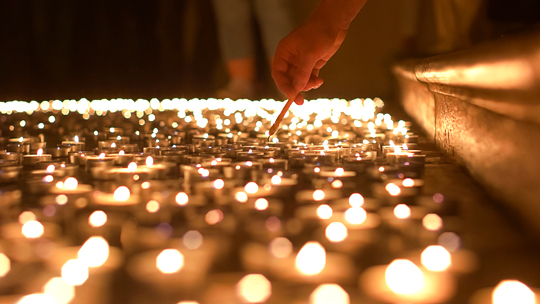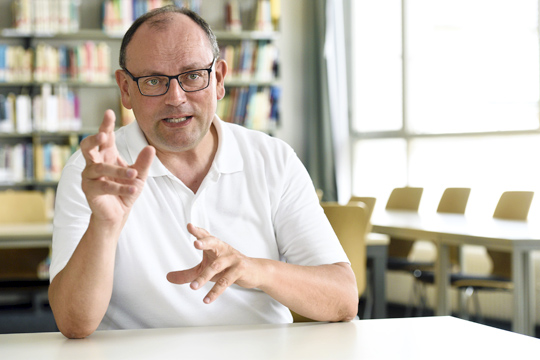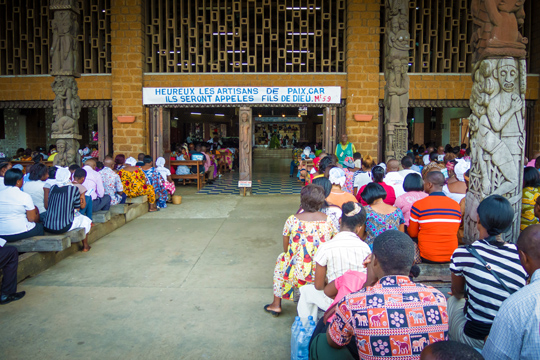Detoxifying Souls
Freiburg, Sep 09, 2019
People who have experienced violence in armed conflicts can suffer for years from their traumas and often pass them on to subsequent generations. Yet these unresolved conflicts harbor the risk of sparking off new cycles of violence, warns Prof. Dr. Klaus Baumann, director of the Section for Catholic Welfare Studies and Christian Social Work at the University of Freiburg’s Faculty of Theology. In interdisciplinary research projects, he and his team are currently studying trauma-induced disorders in two different conflict zones. The main focus of their research is on the spiritual and religious needs of the affected persons, aspects which Baumann says do not yet receive the attention they deserve in the therapy of trauma patients. Verena Adt asked the theologian and registered psychotherapist what help theology has to offer the victims of war traumas.

Can faith be a means of support for who are emotionally marked by violent experiences? A team of researchers at the Section for Catholic Welfare Studies and Christian Social Work aims to get to the bottom of this question. Photo: Pavel Prichystal/Fotolia
Prof. Baumann, how can I live in peace next to a neighbor who has beat my husband or my child before my own eyes?
Klaus Baumann: Yes, how is this possible? This is the kind of dramatic problem we are confronted with in our empirical research on the role of religion and spirituality in the process of reconciliation after armed conflicts. We began this work at my department ten years ago with a pilot study on the question of the spiritual and religious needs of the mentally ill. Now we are dealing specifically with the situation of people in two very different conflict zones. In Croatia and Bosnia-Herzegovina we are studying the traumatic consequences of the Yugoslav Wars fought 20 years ago in persons undergoing psychiatric treatment. In Africa we are dealing with the consequences of the ongoing violence in the East African country of Burundi, which has triggered a mass exodus of mainly young people to Ruanda.
What was the deciding factor in your selection of these two areas?
In the case of the former Yugoslavia, it was a case study conducted by my assistant Andrijana Glavas. She is a doctor and investigated the treatment of people suffering from posttraumatic stress disorders after the war in her native country of Croatia. The study revealed that some of the people received psychiatric treatment for years, but it did them little good. Then we conducted a more extensive study on the role of religiosity and spirituality in coping with trauma-induced disorders after war in cooperation with nine hospitals, in which we interviewed a total of 1200 patients in Croatia and Bosnia-Herzegovina about their needs with regard to spirituality and religiosity – also asking what helps them. We also spoke with the doctors and others working in the professional environment.

Although some people underwent psychiatric treatment for years after the Yugoslav Wars, it often did them little good. This finding motivated the Freiburg researchers to study the role of religiosity and spirituality in coping with trauma-induced disorders following war in Croatia and Bosnia-Herzegovina. Photo: Thomas Kunz
What disorders do these people suffer from?
They have posttraumatic stress disorders and trauma-induced disorders caused by war. The distinguishing marks of a trauma are that it shakes one’s faith in the basic certainties of life to the core and makes one feel completely helpless. According to medical findings, such experiences lead to a posttraumatic stress disorder in approximately one-tenth to one-fifth of those affected. That was no doubt also the case in Germany during and after the war. In the former Yugoslavia, we are studying both patients that were involved in the wars themselves and women, men, and children from the civilian population. The findings reveal that traumas are passed on unconsciously from one generation to the next. As a psychotherapist with psychoanalytical training, I am particularly interested in this finding.
How, concretely, do you go about conducting the studies?
We start by asking: What characterizes the suffering of people who have been affected by war and have to live on after this war experience? This brings us back to your initial question and to Burundi, where we are dealing with such traumas in our other research project, “Peace and Reconciliation in the African Great Lakes Region.” Here we want to interview young people who have fled from the current regime in their country to Ruanda. Many of them are emotionally marked by violent experiences. In Africa, however, such people receive little or no psychiatric or psychotherapeutic treatment. Behavior that deviates from the accepted norm is declared an “obsession” and is stigmatized. This is why our project aims first and foremost to educate through empirical research and cooperation with local universities. The church also needs this and has many possibilities to engage in such educational efforts.

The Church needs to promote more effective means of poverty reduction and sustainable development assistance in Africa and play an active part in them, demands the theologian Klaus Baumann. Photo: Cribe/stock.adobe.com
Is your role in these projects that of a pastor or that of a psychotherapist?
The two belong together. The spiritual-religious aspect is a part of the psychological as a whole, and I think it’s wrong to ignore this fact. But it would not be healthy either to remain fixated exclusively on the religious. In Africa as elsewhere, pastoral care for the victims cannot be catechetical, by which I mean instructive. What is important for them is rather getting to know themselves, enduring themselves, and dealing with their own plight, if possible also with the help of faith. We want to find out whether faith can be a means of support for these people, although it may have been deeply shaken. People with trauma-induced disorders are full of experiences of their own powerlessness, with the struggle for survival, with fears, possibly also with hate and rage. Detoxifying this life of the soul is a task that is deeply Christian, though there is no need to call it Christian.
How can the Church achieve an effect in the conflict zones?
We think of the Church as all baptized persons, ecumenical, as a grassroots structure. The main advantage of the Church is that it already has its own local organizations with the congregations. Groups of people come together to celebrate, to sing, to meet each other. Education also takes place in such places. The idea here – also with the help of disseminators we want to train – is to develop a culture that fosters peace, reconciliation, and acceptance of diversity, not only in the European sense but especially in relation to ethnic differences.

The Church as a grassroots structure: According to the researchers, the task in the local congregations is to develop a culture that fosters peace, reconciliation, and acceptance of diversity. Photo: motortion/stock.adobe.com
What political framework is necessary for societal reconciliation after an armed conflict? What can the Church contribute at this level?
The Church needs to help out with its civil society organizations, like Caritas – the field that is the main emphasis of my research and that which most prominently informs my thinking. Developing solidarity is a very important task, as is political advocacy, the commitment to building up fairer social structures. The Church needs to promote more effective means of poverty reduction and sustainable development assistance and play an active part in them. Our local grassroots structures can help in this endeavor. Also important is the fight against corruption, especially the training of corruption-resistant leaders. Last but not least, it is vital to have a judiciary that is independent of political rule and not susceptible to corruption.
Those are very ambitious and especially very long-term goals. How do you aim to achieve them?
The Church can help to work in this direction and foster education. Education is what it’s about, again and again. Our research and teaching aims to make a contribution. We don’t claim to be one of the really big players in this endeavor, but we need to see the big picture and call it by name. And who if not the Church can afford to take such a long-term perspective? Thankfully, you and we researchers do not always have to keep the next election in mind.

